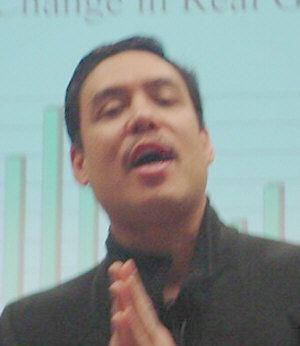www.mybaycity.com
January 27, 2004
(Prior Story) Business ArTicle 349 (Next Story)
Sponsored by Bay Area Chamber of Commerce
Economist Dr. Anthony Chan Sees Economy Growing, Jobs as "Achilles Heel"
|
||||||||||
| Printer Friendly Story View |

The high-traveled Dr. Anthony Chan landed in the Bay Area and sculpted his vision of our economic future at Saginaw Valley State University.
Dr. Anthony Chan, Banc One economist, gave the Tri-County Economics Club a non-partisan, balanced view of the future of the U.S. economy recently.
There is good news: the economy will grow by about 4 percent this year. Dr. Chan has analyzed economic growth and found more real Gross Domestic Product (GDP) growth during Presidential election years. It makes no difference which political party is in power, he said.
However, for the long term, the picture isn't a a pretty one, according to Dr. Chan. In a nutshell, the U.S. is broke, our heavy debt threatens world stability and there is little chance to create enough jobs to offset global shifts.
"We wanted a global economy," said Dr. Chan. "Now we're paying the price for it."
He sees the U.S. dollar being devalued even more in world currency markets because of the high trade deficit as a percentage of GDP; the dollar has already fallen 40 percent against the Euro in the past few years. Thedollar isn't weak against the yen because the Japanese have pumped $188 billion into foreign exchange markets to support it, Dr. Chan said.
A weak dollar may not be all bad, he said, observing that "this allows our manufacturing sector to regain strength." A weak dollar also boosts exports and reduces imports, which are a drag on the economy, said Dr. Chan.
He called the employment situation "the Achilles heel of the U.S." The economy, in the best scenario, will be short 1.5million jobs over the next ten years. In the worst case, the shortfall will be 3.5 million jobs, he said.
A startling statistic: about 8 million are unemployed in the U.S. In China, 100 million to 200 million are estimated to be unemployed, Dr. Chan said. He recently returned from a trip to the Far East where he consulted with the Chinese, Japanese and Korean central banks. Dr. Chan is a frequent commentator on economics on several national television channels including CNN and CNBC. He issenior managing director and chief economist of Banc One Investment Advisors Corporation, Columbus, Ohio.
Dr. Chan's analysis was presaged recently by Paul Craig Roberts, senior research fellow of the Hoover Institute, in a Jan. 8 C-Span discussion of U.S. trade policy. Roberts and other economists described a massive redistribution of income and wealth to China and India. Roberts spoke of "highly mobile factors of production" and of a new phenomena, a "massive infusion of labor supply we didn't have before."
Roberts was highly critical of the causes of the situation, declaring "this is not free trade."
"We are faced with a very real policy conundrum; both parties have pushed free trade and global economic integration," said Lael Brainard, Brookings Institution economist, suggesting: "Perhaps we should stop pushing and declare a moratorium (on globalization) while the economists think this over."
Tom Donahue, president of the U.S. Chamber of Commerce, decried the "acceleration of speed" of the global change, commenting: "We used to be top dog and we don't like it, we used to be in charge and now we're not. We've got to figure out ways to be more efficient."
Donahue noted that in the U.S. labor can move with capital, as reflected in trends from the North and East to the West and South. But labor cannot move to China, he emphasized, commenting that China has "exploited labor because of huge supplies." He added: "the overhang in Chinese labor is several hundred million workers."
Senator Robert Schumer, D-New York, said: "The only thing that will change this arrangement is when American standards are lower than India and China, which may take 30 years." The ladders of upward mobility for younger workers are collapsing, said one commentator, noting: "Students are seeking jobs where they will not be displaced."
Roberts direly predicted that because of the movement of labor the U.S. will be a Third World nation in 20 years.
Dr. Chan and the C-Span commentators said the strength in the U.S. economy is not in large corporations like General Motors and General Electric but in the 20 million small businesses. Any growth will have to come from that sector of the economy, they said.
| Printer Friendly Story View |
|
|

Dave Rogers |
|
|
|
Printer-Friendly Story View
0200 Nd: 04-13-2024 d 4 cpr 0
12/31/2020 P3v3-0200-Ad.cfm
SPONSORED LINKS
12/31/2020 drop ads P3v3-0200-Ad.cfm


